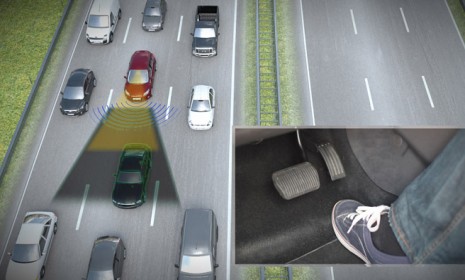Ford's 'Traffic Jam Assist': Are we close to a driverless car?
Soon, frustrated motorists might have the option of kicking back on congested highways and letting their cars do the driving

A free daily email with the biggest news stories of the day – and the best features from TheWeek.com
You are now subscribed
Your newsletter sign-up was successful
Ford Motor Company is joining the race to develop a hands-off system that would let motorists relax while cars drive and park themselves. At an event showcasing the automaker's 2013 models on Tuesday, Ford unveiled a a new tool called Traffic Jam Assist, which will give drivers the option of handing over control to the car in slow, heavy traffic. Is this a leap toward the dream of kicking back while a Jetsonian driverless car takes you where you want to go? Here's what you should know:
How does Traffic Jam Assist work?
The system uses radar and cameras to keep track of all surrounding vehicles on a congested highway where cars are crawling at a snail's pace, and responds to what it sees by speeding up, slowing down, or stopping. (Watch a demo video below.) Traffic Jam Assist can also steer, keeping your vehicle in its lane, incorporating the capabilities of existing technology including cruise control, Ford Active Park Assist, and Lane Keeping Aid. "The motorist is then free to take his hands off the steering wheel and feet off the pedals," says Ray Massey at Britain's Daily Mail, "while he enjoys some much-needed relaxation." When traffic speeds up, the system returns control to the driver.
The Week
Escape your echo chamber. Get the facts behind the news, plus analysis from multiple perspectives.

Sign up for The Week's Free Newsletters
From our morning news briefing to a weekly Good News Newsletter, get the best of The Week delivered directly to your inbox.
From our morning news briefing to a weekly Good News Newsletter, get the best of The Week delivered directly to your inbox.
Is this really such a big deal?
Ford certainly thinks so. "Drivers spend more than 30 percent of their time in heavy traffic," Ford research engineer Joseph Urhahne says. "Traffic Jam Assist could help make traveling through congestion a more relaxing experience and, by keeping pace with the flow of traffic, potentially help relieve road congestion." Simulation studies suggest that if a quarter of the vehicles on a road are equipped to automatically follow the flow, travel times can be slashed by 37.5 percent and delays by 20 percent. Researchers also hope automation can help curb fatalities by cutting down on driver error.
When will the technology be available?
Ford says some models might sport the auto-pilot technology within five years. The breakthrough is part of a race among several companies, including General Motors and Google, to build a fully self-driving car. Ford CEO Bill Ford, great-grandson of company founder Henry Ford, says that futuristic dream could be a reality by 2025.
A free daily email with the biggest news stories of the day – and the best features from TheWeek.com
See for yourself:
Sources: Daily Mail, Detroit Free Press, Huffington Post, Wall Street Journal